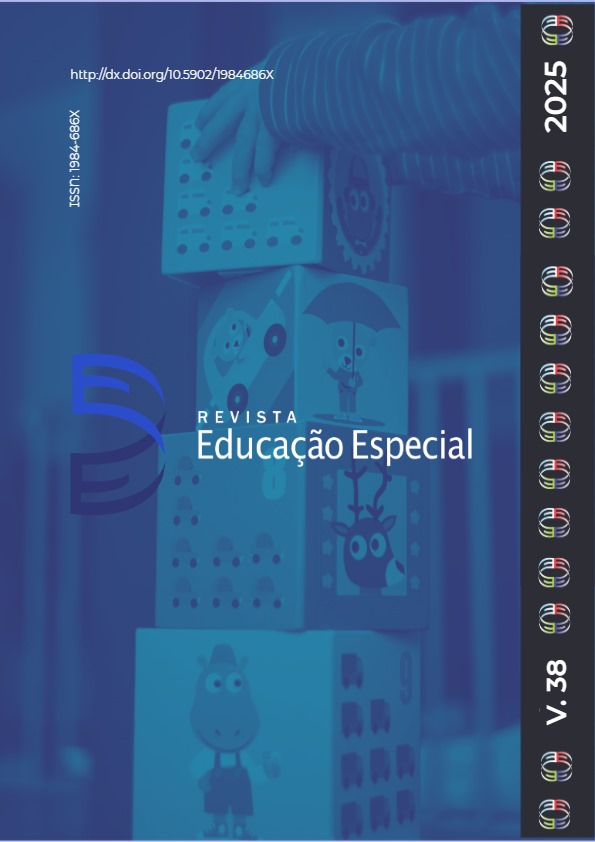Study of Dyscalculia in Pedagogy Courses at Public Higher Education Institutions in Brazil
DOI:
https://doi.org/10.5902/1984686X88481Keywords:
Specific Learning Disability, Dyscalculia, PedagogyAbstract
Our objective was to research the inclusion of the study of Dyscalculia in the Pedagogical Projects of the Courses of Degrees in Pedagogy of Public Higher Education Institutions in Brazil. Dyscalculia is a neurodevelopmental disorder that affects the specific learning of mathematics, in view of this we seek to know: how are Dyscalculia studies included and configured in the curricula of Degrees in Pedagogy of Public Higher Education Institutions in Brazil? We adopted Documentary Research with Content Analysis and as a conceptual reference the APA-American Psychiatric Association (2014), World Health Organization (1993/2011), Rotta; Ohlweiler; Riesgo (2016), Kosc (1974) and Hudson (2019). The research corpus consisted of 260 Pedagogical Projects of Pedagogy Courses. The analysis of the data allowed us to determine that Dyscalculia studies are included in only 16 of the total of 260 Pedagogical Projects of the Courses, distributed in: 3 mandatory Curricular Components, 11 optional and 2 elective, presented in 15 different nomenclatures. Thus, we can conclude that there is a discrepant gap in the study of dyscalculia, whose insufficiency represents a deficit in the professional learning process of future pedagogues in Brazil. This requires curriculum reformulation to include dyscalculia studies in initial teacher training.
Downloads
References
AMERICAN PSYCHIATRIC ASSOCIATION-APA. Manual Diagnóstico e Estatístico de Transtornos Mentais: DSM-5. Tradução: Maria Nascimento et al. 5. ed. Porto Alegre: Artmed, 2014.
BARDIN, Laurence. Análise de Conteúdo. Lisboa/Portugal: Edições 70, 1977.
BARDIN, Laurence. Análise de Conteúdo. São Paulo: Edições 70/Almedina, 2016.
BERNARDI, Jussara. Discalculia: o que é? como intervir? Jundiaí: Paco Editorial, 2014.
BRASIL. Ministério da Educação. e-MEC. Disponível em: http://emec.mec.gov.br. Acesso em: 12 jan. 2022.
COSENZA, Ramon Moreira; GUERRA, Leonor Bezerra. Neurociência e Educação: como o cérebro aprende. Porto Alegre: Artmed, 2011.
HUDSON, Diana. Dificuldades Específicas de Aprendizagem. Petrópolis/RJ: Vozes, 2019.
INSTITUTO FEDERAL CATARINENSE-IFC. Projeto Pedagógico do Curso de Licenciatura em Pedagogia. Blumenau: [s.n.], 2017.
KOSC, Ladislav. Developmental Dyscalculia. Journal of Learning Disabilities. Bratislava, v. 7, n. 3, 1974. Disponível em: https://www.deepdyve.com/lp/sage/developrnental-dyscalcula-sf4Wwplmja. Acesso em: 7 maio 2013. DOI: https://doi.org/10.1177/002221947400700309
KUBO, Olga Mitsue; BOTOMÉ, Sílvio Paulo. Ensino-aprendizagem: uma interação entre dois processos comportamentais. Interação em Psicologia, Curitiba, v. 5, i 13321, 2001. Disponível em: Ensino-aprendizagem: uma interação entre dois processos comportamentais | Kubo | Interação em Psicologia (ufpr.br). Acesso em: 27 nov. 2022. DOI: https://doi.org/10.5380/psi.v5i1.3321
LOPES, Leide Maria Leão; PEREIRA, Pedro Carlos. Uma análise do Processo de Aprendizagem em Matemática de Alunos com Discalculia. Curitiba: CRV, 2018. DOI: https://doi.org/10.24824/978854442410.0
OHLWEILER, Lygia. Introdução aos Transtornos da Aprendizagem. In: ROTTA, Newra Tellechea; OHLWEILER, Lygia; RIESGO, Rudimar dos Santos. Transtornos da Aprendizagem: Abordagem Neurobiológica e Multidisciplinar. 2. ed. Porto Alegre: Artmed, 2016. p. 107-111.
ORGANIZAÇÃO MUNDIAL DE SAÚDE-OMS. Classificação dos Transtornos Mentais e de Comportamento da CID-10: descrições clínicas e diretrizes diagnósticas. Tradução: Dorgival Caetano. Porto Alegre: Artmed, 1993.
ROTTA, Newra Tellechea. Dificuldades para Aprendizagem. In: ROTTA, Newra Tellechea; OHLWEILER, Lygia; RIESGO, Rudimar dos Santos (orgs). Transtornos da Aprendizagem: Abordagem Neurobiológica e Multidisciplinar. 2. ed. Porto Alegre: Artmed, 2016. p. 94-104.
SACRISTÁN, José Gimeno. O Currículo: uma reflexão sobre a prática. Tradução: Ernani Rosa. 3. ed. Porto Alegre: Penso, 2017.
SANTOS, Flávia Heloísa dos. Discalculia do Desenvolvimento. São Paulo: Pearson Clinical Brasil, 2017.
TARDIF, Maurice. Saberes Docentes e Formação Profissional. 17. ed. Petrópolis/RJ: Vozes, 2014. DOI: https://doi.org/10.5212/OlharProfr.v.17i2.0010
UNIVERSIDADE DO ESTADO DA BAHIA-UNEB. Projeto Pedagógico do Curso de Pedagogia – reformulado. Salvador: [s.n.], 2007.
UNIVERSIDADE ESTADUAL DE FEIRA DE SANTANA-UEFS. Projeto Pedagógico do Curso de Licenciatura em Pedagogia. Feira de Santana: [s.n.], 2018.
UNIVERSIDADE ESTADUAL DE GOIÁS-UEG. Projeto Pedagógico do Curso de Graduação em Pedagogia. Pires do Rio: [s.n.], 2018.
UNIVERSIDADE ESTADUAL DE MARINGÁ-UEM. Resolução Nº 100/2009-CI/CCH. Cianorte: [s.n.], 2009.
UNIVERSIDADE ESTADUAL DE MARINGÁ-UEM. Projeto Pedagógico do Curso de Graduação em Pedagogia. Maringá: [s.n.], 2018.
UNIVERSIDADE ESTADUAL DO CEARÁ-UECE. Projeto Pedagógico do Curso de Licenciatura em Pedagogia. Fortaleza: [s.n.], 2008.
UNIVERSIDADE FEDERAL DA PARAÍBA-UFPB. Projeto Político Pedagógico do Curso de Pedagogia. João Pessoa: [s.n.], 2006.
UNIVERSIDADE FEDERAL DE MATO GROSSO DO SUL-UFMS. Resolução Nº 589 de dezembro de 2018. Três Lagoas, 2018.
UNIVERSIDADE FEDERAL DO CARIRI-UFCA. Projeto Pedagógico do Curso de Licenciatura Plena em Pedagogia. Brejo Santo: [s.n.], 2018.
UNIVERSIDADE FEDERAL DO CEARÁ-UFC. Projeto Pedagógico do Curso de Pedagogia. Fortaleza: [s.n.], 2014.
UNIVERSIDADE FEDERAL DO RIO GRANDE DO SUL-UFRGS. Projeto Pedagógico do Curso de Licenciatura em Pedagogia. Porto Alegre: [s.n.], 2019.
UNIVERSIDADE FEDERAL DO TOCANTINS-UFT. Resolução Nº 27, de 29 de junho de 2018 - Projeto Pedagógico do Curso de Licenciatura em Pedagogia. Miracema: [s.n.], 2018.
UNIVERSIDADE FEDERAL DO TOCANTINS-UFT. Resolução Nº 38, de 29 de junho de 2018. Tocantinópolis: [s.n.], 2018.
UNIVERSIDADE FEDERAL RURAL DE PERNAMBUCO-UFRPE. Projeto Pedagógico do Curso de Licenciatura em Pedagogia. Recife: [s.n.], 2018.
Published
How to Cite
Issue
Section
License
Copyright (c) 2025 Special Education Magazine

This work is licensed under a Creative Commons Attribution-NonCommercial 4.0 International License.
Declaration of originality
We declare that all articles present in the journal Revista Educação Especial (UFSM) are originals and were not submitted for publishing on any other publication, as a whole or a fraction. We also declare that, after being published by Revista Educação Especial (UFSM), a paper will not be submitted to another journal within two years. After this time, our journal transfers the publishing rights to the authors, with a permit granted by the Editorial Council.
We also acknowledge that the originals’ submission to Revista Educação Especial (UFSM) implies on a transference of copyright for physical and digital publishing to the journal. In case of noncompliance, the violator will receive sanctions and penalties predicted by the Brazilian Copyright Protection Law (n. 9610, dated 19/02/98).







